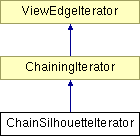ChainSilhouetteIterator Class Reference
#include <ChainingIterators.h>
Inheritance diagram for ChainSilhouetteIterator:

Detailed Description
A ViewEdge Iterator used to follow ViewEdges the most naturally. For example, it will follow visible ViewEdges of same nature. As soon, as the nature or the visibility changes, the iteration stops (by setting the pointed ViewEdge to 0). In the case of an iteration over a set of ViewEdge that are both Silhouette and Crease, there will be a precedence of the silhouette over the crease criterion.
Public Member Functions | |
| ChainSilhouetteIterator (bool iRestrictToSelection=true, ViewEdge *begin=NULL, bool orientation=true) | |
| ChainSilhouetteIterator (const ChainSilhouetteIterator &brother) | |
| virtual string | getExactTypeName () const |
| virtual ViewEdge * | traverse (const AdjacencyIterator &it) |
Constructor & Destructor Documentation
|
||||||||||||||||
|
Builds a ChainSilhouetteIterator from the first ViewEdge used for iteration and its orientation.
|
|
|
Copy constructor |
Member Function Documentation
|
|
Returns the string "ChainSilhouetteIterator" Reimplemented from ChainingIterator. |
|
|
This method iterates over the potential next ViewEdges and returns the one that will be followed next. When reaching the end of a chain, 0 is returned. Reimplemented from ChainingIterator. |
The documentation for this class was generated from the following file: